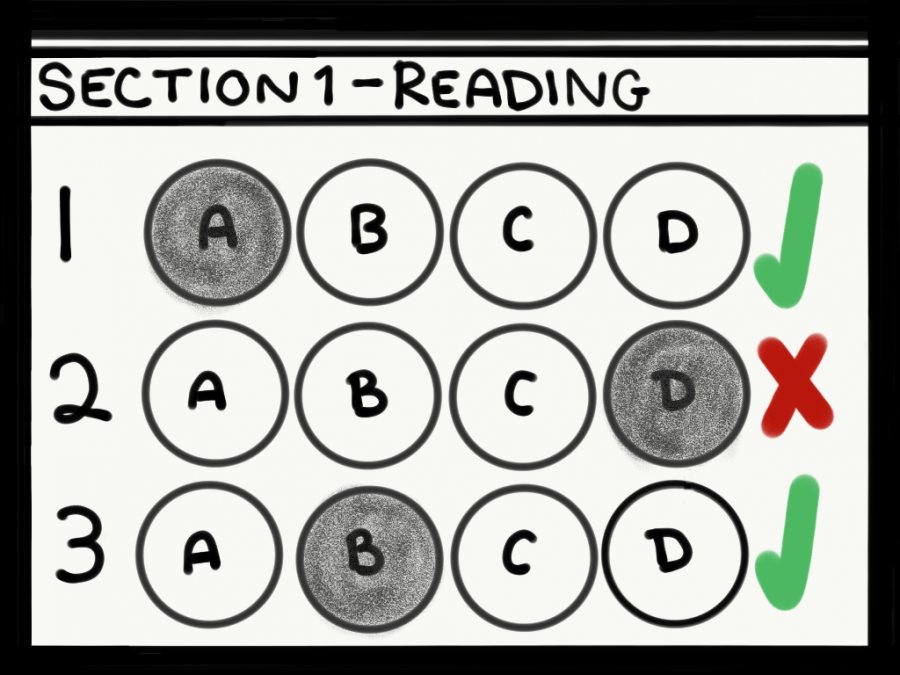Dear universities and colleges of America…
Students who have taken standardized tests usually don’t enjoy them. I know I didn’t. Lately, standardized tests have become more and more prominent in teenagers’ lives and even elementary school students. According to the Washington Post, they’ve become the “hallmark of modern schools.”
Every year, the tests get progressively harder — with the junior year being one of the most stressful times. At this point, the students and the colleges have placed high stakes on them. Standardized tests, like the ACT and SAT, should not be a big factor in the college admissions process.
Standardized tests do not accurately measure a student’s potential to perform in college. FairTest — an organization that promotes fair evaluations of students — has brought to light that these tests “don’t measure the ability to think deeply or creatively in any field.”
And they’re right.
These tests might be challenging, but they certainly do not test our ability to think deeply. They ask a question and provide four-to-five choices, one of which is the right answer. They are straightforward and single-minded, which is not at all what it is like in college.
Sure, college tests have multiple choice questions, but they also have questions where the student has to think deeply and answer questions that require an independently written answer. I understand that there is an essay portion in these tests, but most colleges don’t place much value on them compared to the other sections.
In addition, they do not measure a student’s ability to perform in college because a college test isn’t a combination of multiple different subjects. College tests focus on one subject and the content that you learned up to that point. No one has to relearn or remember all the math, grammar, or science they learned over the past three to four years.
Shouldn’t tests like the SAT and ACT — tests that weigh so much in the college admissions process — be reliable? A reliable test should mean that a student gets a similar score each time they take it, but a high school junior knows that is not the case. The day of the test itself can affect the score for better or for worse.
“Non-profit” organizations – including ACT Inc. and College Board – create an uneven playing field for prospective college students. Both the president of College Board and the former executive officer of ACT Inc. made over a million dollars in 2011. The value of the overall standardized testing market was reported to be anywhere between $400 and $700 million dollars by the National Board on Educational Testing and Public Policy at Boston College.
These organizations have become like the Coca-Cola and Pepsi of the standardized testing market. They were made for money, kept for money, and circle around money. Both of these members profit off of the students taking these tests. Sometimes it’s easy to forget that the companies that administer standardized tests are businesses, and just like every other business they are intended to make a profit.
They might appear to be a fair measure of a students intellect but in reality, they are a measure of socioeconomic status. Even though most schools offer at least one free SAT or ACT and free resources like Khan Academy exist, that doesn’t mean it’s any less unbiased.
Some students might not have access to computers or wifi to use Khan Academy. Some students can buy a better score by paying for private coaching. And some are capable enough to take these tests as many times as they wish, whereas disadvantaged students might only have the chance to take it once.
Because the scores can be bought, the market is big and profitable. And unfortunately, standardized tests are biased towards the rich and create stronger class divisions while reinforcing the cycle of poverty.
College Board itself explains how higher family income and education leads to a higher score, in a report from 2013.
Overall, a biased test score is not an accurate evaluation of a student’s abilities.
Additionally, these tests are known for inducing high levels of stress and anxiety, which can be debilitating to a student’s mental health. According to a Harvard report, test-related stress has worsened in recent years causing many health consequences: stomach aches, vomiting, headaches, sleeping problems, attendance problems, acting out and severe cases like depression. After seeing that entire list, isn’t it clear that things need to change?
I have taken practice tests where it ended with having an unbearable headache that would keep me awake. There would be nights where it felt like I never really slept at all but rather stayed awake with my thoughts. I know that what I went through doesn’t compare to what others go through, but it’s something no one else should feel.
Schools should help students with anxiety and depression disorders, but these tests might actually worsen their symptoms. Therefore, tests like the ACT and SAT shouldn’t be big deciding factors knowing how damaging they can be to our mental health.
With all these negatives to standardized testing, they shouldn’t weigh a lot in the college admissions process. Rather, things like GPA, teacher recommendation letters and personal essays should have a higher importance in the selection process.
Students should not have to spend large amounts of their time preparing for and taking these tests when they can instead spend that time on exploring their interests through extracurriculars, community service or on gaining work experience. Thanks to organizations like FairTest things are changing: colleges are making these tests optional. We should be encouraging more and more colleges to start changing their practices. Eventually, with these tests gone, students might have enjoyable high school experiences.
Sincerely, Meghana Tummala









